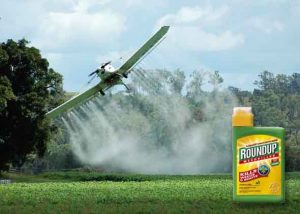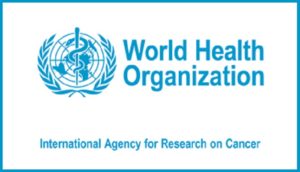September 20, 2018 – San Diego, CA. More news of Monsanto/Bayer Corporations controversial weed killer called Roundup is still making headlines with many people asking if Roundup does in fact cause cancer. We’ll look at the time of scientific studies done and will let you draw your own conclusions.
What is Roundup Weed Killer?
Roundup is an herbicide used to kill weeds and grass on home lawns, in gardens and on agricultural fields. The product was first introduced to the consumer marketplace in 1976 by Monsanto Company and has since been used by millions of consumers and industry professionals alike. Last year Bayer Pharmaceuticals purchased the rights to the Roundup product line.
Roundup is a weed and grass killer. It is used to control unwanted pests in gardens and on lawns at home, and is also used on agricultural fields to keep weeds from overtaking crops. There are even Roundup Ready seeds that are genetically engineered to be resistant to the herbicide, allowing farmers to spray Roundup directly onto crops and kill only the weeds around them.
Roundup works by targeting and inhibiting a specific enzyme found only in plants. Roundup’s active ingredient, glyphosate, inhibits this enzyme and prevents the plant from making certain proteins needed for growth. Roundup is absorbed mostly through the plant’s leaves and is effective in killing a wide variety of plants.
Is there a link between Roundup exposure and cancer?
Dozens of studies have been published since the late 1990s analyzing the safety of Roundup’s main ingredient, glyphosate. Many of these studies link the weed killer to a deadly form of blood cancer called non-Hodgkin lymphoma and its subtypes.
A 2002 study published in the journal Leukemia & Lymphoma pooled results from two case-control studies and found people exposed to glyphosate were at a three-fold increased risk of developing NHL or a rarer subtype called hairy cell leukemia.
A 2003 study published in the BMJ’s Occupational and Environmental Medicine pooled data from three case-control studies of NHL conducted in the Midwest by the National Cancer Institute in the 1980s. The study found that men who lived or worked on a farm as adults had a 10% increase in risk for developing NHL compared to men who did not. The study also found that exposure to glyphosate in particular doubled these individuals’ risks for developing NHL.
More recent studies have also linked glyphosate to an increase in risk for NHL and its subtypes.
A Swedish study published in 2008 in the International Journal of Cancer found exposure to glyphosate increased a person’s risk for developing NHL by more than double and increased a person’s risk for developing a subtype of NHL, called B-cell lymphoma, by 87%.
In 2014, a study published in the International Journal of Environmental Research and Public Health found people exposed to glyphosate at work had a two-fold increased risk of developing B-cell lymphoma.
Even a study sponsored by Monsanto, published this year in the Journal of Environmental Sciences and Health, found a 40% increase in risk for B-cell lymphoma and a 30% increase in risk for NHL when exposed to the herbicide. The authors of the Monsanto-sponsored study were quick to point out that no “causal relationship” has been found between glyphosate exposure and NHL, meaning they could not necessarily prove it was the glyphosate that caused the increased risk in NHL or its subtypes.
Many of these studies found a dose-dependent relationship between exposure to Roundup and the development of NHL. This means the more Roundup people were exposed to, the more their risk increased for developing NHL.
In March 2015 the World Health Organization’s International Agency for Research on Cancer (IARC) conducted a study on humans exposed to the active ingredient glyphosate through agricultural work and from laboratory experiments on animals. In a published statement they concluded that “there was limited evidence of carcinogenicity [for the herbicide glyphosate] in humans for non-Hodgkin lymphoma.” They have classified glyphosate as a Group 2A substance that is “probably carcinogenic to humans.”
In November 2015 the European Union’s Food Safety Authority (EFSA) delivered their review on the carcinogenicity of glyphosate. This study looked at exposure to glyphosate through food and came up with this statement: “all the [European Union] Member State experts but one agreed that neither the epidemiological data (i.e. on humans) nor the evidence from animal studies demonstrated causality between exposure to glyphosate and the development of cancer in humans.”
In the United States we have the National Toxicology Program (NTP). This contains a few different government agencies such as the National Institute of Health (NIH), the Centers for Disease Control and Prevention (CDC) and the Food and Drug Administration (FDA). Their main work is to maintain a list of all chemicals “known to be [a] human carcinogen” or “reasonably anticipated to be human carcinogens”.
Their latest update from November 2016 does not list glyphosate as a carcinogen.
May 2016, the World Health Organization and the United Nations’ Food and Agricultural Organization (FAO) came together to discuss the potential dangers of glyphosate in humans from residue in foods. They came to the conclusion “that glyphosate is unlikely to pose a carcinogenic risk to humans from exposure through the diet.”
Does the recent Court Verdict prove Roundup linked to Cancer?
In the August 12, 2018 court case Johnson v. Monsanto, a jury was asked to decide the likely cause of the illness, in this case a rare blood cancer called Non-Hodgkin lymphoma (NHL).
The jury was pressed with specific questions. The following are actual excerpts from the filed court papers dated August 10, 2018. Case number: CGC-16-550128. DEWAYNE JOHNSON v. MONSANTO COMPANY. The bold type YES or NO were the jury’s answers.
VERDICT FORM
CLAIM OF DESIGN DEFECT
1. Are the Roundup Pro or Ranger Pro products ones about which an ordinary consumer can form a reasonable minimum safety expectations? YES or NO.
2. Did Roundup Pro or Ranger Pro fail to perform as safely as an ordinary consumer would have expected when used of misused in an intended or reasonably foreseeable way? YES or NO.
3. Was the Roundup Pro or Ranger Pro design a substantial factor in causing harm to Mr. Johnson? YES or NO.
CLAIM OF STRICT LIABILITY – FAILURE TO WARN
4. Did Roundup or Ranger Pro have potential risks that were known or knowable in light of the scientific knowledge that was generally accepted in the scientific community at the time of their manufacture, distribution or sale? YES or NO.
5. Did the potential risks of Roundup Pro or Ranger Pro present a substantial danger to persons using or misusing Roundup Pro or Ranger Pro in an intended or reasonable foreseeable way? YES or NO.
6. Would ordinary consumers have recognized the potential risks? YES or NO.
7. Did Monsanto fail to adequately warn of the potential risks? YES or NO.
8. Was the lack of sufficient warnings a substantial factor in causing harm to Mr. Johnson? YES or NO.
CLAIM OF NEGLIGENT FAILURE TO WARN
9. Did Monsanto know or should it reasonably have known that Roundup Pro or Ranger Pro were dangerous or were likely to be dangerous when used or misused in a reasonably foreseeable manner? YES or NO.
10. Did Monsanto know or should it reasonably have known that users would not realize the danger? YES or NO.
11. Did Monsanto fail to adequately warn of the danger or instruct on the safe use of Roundup Pro or Ranger Pro? YES or NO.
12. Would a reasonable manufacturer, distributor, or seller under the same of similar circumstances have warned of the danger or instructed on the safe use of Roundup Pro or Ranger Pro? YES or NO.
13. Was Monsanto’s failure to warn a substantial factor in causing harm to Mr. Johnson? YES or NO.
CLAIM OF DAMAGES
14. What are Mr. Johnson’s damages?
Past economic loss: $ 819,882.32
Future economic loss: $ 1,433,327.00
Past noneconomic loss: $4,000,000.00
Future noneconomic loss: $33,000,000.00
PUTITIVE DAMAGES
15. Did you find clear and convincing evidence that Monsanto acted with malice or oppression in the conduct upon which you base your finding of liability in favor of Mr. Johnson? YES or NO.
16. Was the conduct constituting malice or oppression committed, ratified, or authorized by one of more officers, directors, or managing agents of Monsanto acting on behalf of Monsanto? YES or NO.
17. What amount of punitive damages, if any, do you award to Mr. Johnson?
(Hand written) $250,000,000.00
What does this Monsanto Roundup Court Ruling mean to me?
For people who have been exposed to Roundup Pro or Ranger Pro weed killers this is a landmark decision. It has exposed the company’s negligence and their willingness to cover up evidence to harm in favor of profits.
This has now made it easier and has set precedent for more than 4,000 cases that are already lined up in various courts across the United States. Now anyone who has been diagnosed with any type of blood cancer from the use of Roundup can sue Monsanto for failure to warn.
Who can participate in the Roundup Cancer Lawsuits?
Occupations that require workers to handle Roundup directly or indirectly may be most at-risk. A few examples of these occupations include:
- Crop farm workers and laborers
- Nursery or greenhouse workers
- Agricultural equipment operators
- Soil scientists and surveyors
You don’t have to work on a farm to be exposed to Roundup. Glyphosate residues are found in the air and drinking water near agricultural fields where they are applied, putting whole communities at risk.
If you or someone you love was exposed to Roundup and were diagnosed with non-Hodgkin lymphoma or another blood cancer, you may be entitled to compensation. The legal team at National Injury Help is ready to answer your questions and help you determine if your case qualifies for a Roundup Cancer Lawsuit.
Call National Injury Help today at 1-800-214-1010 for a free case evaluation or use the form on the bottom of your screen.
Note: The information provided in this article is based on reports from publicly available sources, including news outlets, police reports, and eyewitness accounts. National Injury Help has not independently verified all details of the reported incident. If you find any inaccurate or outdated information, please contact us, and we will review and update the content as appropriate. The photo used in this post is for illustrative purposes only and does not depict the actual scene of the incident.
Disclaimer: The content of this article is intended for informational purposes only and does not constitute legal advice or establish an attorney-client relationship with National Injury Help. For legal assistance specific to your case, we encourage you to contact a qualified attorney.
Free Case Evaluation
Contact Us today for a FREE, Immediate Case Evaluation
Contact Us today for a FREE, Immediate Case Evaluation
Categories
Recent post
- Tucson, AZ – One Injured in Auto Wreck at 22nd and Osborne
- Tucson, AZ – One Injured in Early Morning Crash at Shiloh and Banff
- Tucson, AZ – One Injured in Crash at Palo Verde and Drexel
- Tucson, AZ – Una persona herida en accidente cerca de West Crestilloma Dr
- Phoenix, AZ – Cuatro en estado crítico tras accidente cerca de 40th St y McDowell Rd







